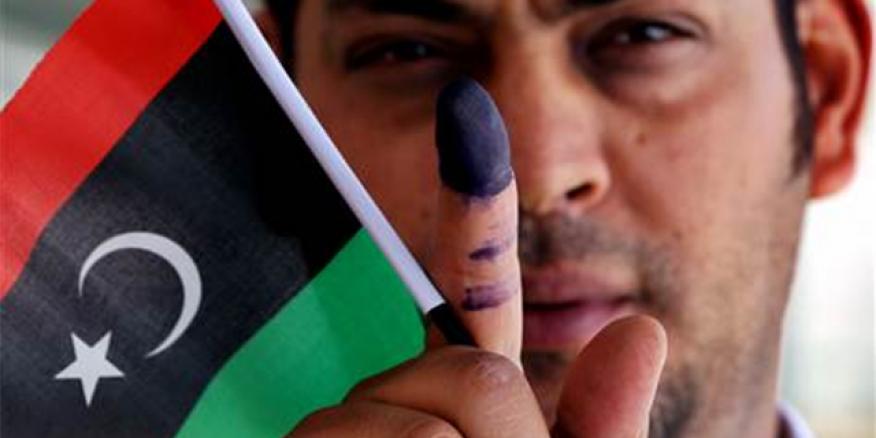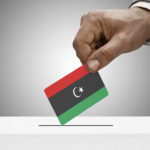The Defender Center’s (CHRDA) fourth quarterly report on the situation of human rights in Libya
(April-June 2021)
The Defender Center’s fourth quarterly report on the situation of human rights in Libya
(April-June 2021)
Defender Center for Human Rights has followed up, with great concern, the outcomes of the Libyan Political Dialogue Forum, especially about the crisis of agreement on the constitutional basis on which the general elections are supposed to be held next December. The Center also followed up on the Second Berlin Conference, which became a general event in which the concerned international and regional parties involved in the Libyan crisis meet but without the political will of the international community to implement the conclusions of the conference.
As fears grow among many Libyans, about the possibility of not holding elections in December according to the road map which threatens to plunge the country into more chaos, the situation for human rights defenders and peaceful political activists is becoming more and more dangerous as the election date approaches. The kidnapping of human rights defender Mansour Atti is strong evidence of the lack of political will on the part of the national unity government to protect freedom of expression and peaceful assembly, all of which are guarantees that must be in place if there is a serious desire to hold transparent and fair elections.
The failure of consensus on the constitutional basis for elections
On the second of this month (July), while the Libyans were waiting to announce the results of the negotiating round of the Libyan Political Dialogue Forum, which was held in Geneva, and to reach consensus on the constitutional basis on which the legislative and presidential elections to be held on December 24 will be based, everyone was surprised by the statements of Residen Zeninga, Assistant Secretary-General, and Coordinator of the United Nations Support Mission in Libya, regarding the failure of the talks to reach the agreement that the Libyan people are waiting for.
While the lack of consensus on the constitutional basis threatens the ability to implement the framework of the road map that the Libyan Political Dialogue Forum concluded, the fate of holding the general elections that will determine the future of Libya is now in the hands of the parliament, which announced the start of preparing new legislation regarding the presidential elections. This new legislation can be considered a constitutional basis for the elections. In this context, Parliament also proceeded to “allocate electoral constituencies across the country to meet the electoral entitlement on time.”
Recently, a member of the Presidential Council, Moussa al-Koni, said that the council may have to issue a “presidential decree with the force of law to be published in the Official Gazette to adopt a constitutional rule in consultation with several parties that constitute the legal framework for the upcoming elections in December 2021.” Al-Koni revealed that this idea was presented to the Supreme Court, the Judicial Council and the United Nations Support Mission in Libya, stressing that it would be a “last option to prevent further discord among the Libyans.”
Despite this, there are no tangible indications yet of the possibility of resolving the crisis of the constitutional basis, which leaves uncertainty surrounding the fate of the parliamentary elections and the referendum on the constitution. In light of the fragile political and security situation in the country and the declining credibility of the Forum for Political Dialogue, concerns are strongly renewed about the possibility of the failure to hold the general elections as stipulated in the road map. Subsequently, Libya could fall into a new cycle of chaos, violence, and instability, and the repeated failure to salvage its chance to achieve the long-awaited democratic transition.
While the controversy over the constitutional basis continues, the Berlin 2 Conference was held in June 2021, about 18 months after the first Berlin Conference. Perhaps the most prominent statement in the conference’s final statement is the confirmation of the Prime Minister of the National Unity Government, Abdel Hamid Dabaiba, of his commitment to organize the presidential and parliamentary elections on schedule, despite all doubts about the possibility of implementing this commitment. In addition, he declared that “all foreign forces and mercenaries must withdraw from Libya without delay.” Media outlets have indicated that Turkey, which has a strong military presence in Libya, has expressed a “reservation”, without further explanation, about Mr. Dabaiba’s declaration.
Obligating all foreign forces and mercenaries to withdraw from Libyan territory is necessary to preserve Libya’s security, support the chances of holding elections, and support stability in the country. However, the lack of serious political will that goes beyond the statements announced through different media outlets, does not bode well for the possibility of achieving the recommendations of the Berlin Conference. In addition to Turkey’s aforementioned reservation, the German Foreign Minister Heiko Maas’ speech before the conference, highlighted the failure of different parties in the Libyan crisis to keep their promises. Mr. Maas indicated that the parties that pledged during the first Berlin meeting to withdraw their forces did not fulfil those promises.
The Kidnapping of a human rights defender
Under the Government of National Unity, human rights defenders continue to face grave dangers. The political will to promote human rights and protect freedom of expression, the right to peaceful assembly and the right to organize civil associations is not yet available, a situation that, if it persists, will represent a serious threat to the legitimacy and credibility of the elections scheduled for December 24.
While the first week of April witnessed the release of civil activist Jamal Adas, head of the Civil Society Commission branch in Tripoli after he was kidnapped for about a week, the evening of June 3 witnessed the kidnapping of the journalist and human rights defender Mansour Atti Al-Maghraby by individuals riding three Toyota cars in the center of Ajdabiya (eastern Libya), near the headquarters of the local Red Crescent Committee. The cars did not have distinctive signs or number plates. According to witnesses, the cars were last seen at the eastern gate of Ajdabiya. Until the time of writing of this report, the fate of Atti is still unknown. The Libyan authorities ignored the calls of Libyan, regional, and international human rights organizations to reveal the fate of Atti.
Various evidence indicates that Atti is being held by the Internal Security Services in Benghazi. It became clear to the majority of Libyan human rights organizations that Atti was kidnapped as a result of his peaceful work in the field of civil society and human rights. Defender Center, as part of its membership in the Libya Platform coalition, participated in sending an urgent appeal to the Special Rapporteur on the rights to freedom of peaceful assembly and organizing civil associations, the Special Rapporteur on the promotion and protection of the right to freedom of opinion and expression, and the Special Rapporteur on the situation of human rights of defenders of Human Rights, the Working Group on Enforced or Involuntary Disappearances. This is in order to immediately reveal the fate of Atti, provide the necessary clarification on his kidnapping and the legality of the procedures, and ensure his access to his family and his lawyer.
Defender Center also sent an urgent message to the Prime Minister of the Government of National Unity and the Attorney General in Libya demanding immediate action to reveal the whereabouts of Atti and to clarify whether he is being legally detained, and if this is the case, it is necessary to ensure that he communicates with his lawyer. In the event that the authorities are unable to prove that he has been detained because he has committed a crime, the Public Prosecutor should immediately order his release and allow him to undergo a medical examination to verify that he has not been subjected to any form of torture or ill-treatment while in detention. This is in addition to the need to open an investigation into the incident of his kidnapping and forcible disappearance without a judicial order from the Public Prosecutor, and to hold the security officials involved in the kidnapping crime accountable.
The “Abu Salim Prison Massacre case” is back in court
On May 2, 2021, Defender Center welcomed the ruling issued by the Second Criminal Chamber of the Supreme Court to quash the ruling issued on December 15, 2019, by the Ninth Criminal Chamber of the Court of Appeal in Tripoli related to the Abu Salim prison massacre, – Case No. 100 of 2014 and Restricted No. 782 of 2017 year record. The ruling that was quashed stipulated that the crime attributed to the perpetrators of the Abu Salim prison massacre had expired, on the grounds that the time had passed and the statute of limitations had passed. According to the decision of the new Criminal Chamber of the Supreme Court, the case will be returned to the Tripoli Criminal Court to be considered again before a new Chamber.
Defender Center stresses that the latest ruling is a step towards achieving the long-awaited justice, and calls for revealing the truth, holding the perpetrators accountable, and bringing justice to the victims and their families. The Center hopes that the new trial proceedings will proceed publicly, in full compliance with international fair trial standards.
It is worth noting that on June 29, 1996, the former political regime committed one of its most egregious violations in the field of human rights, in the massacre of about 1275 detainees, most of whom were prisoners of conscience. Abu Salim is considered one of the prisons that held prisoners of conscience and political detainees and is subject to security agencies linked to the General Intelligence Service, which was considered a breach and clear violation of articles 32 and 33 of the Libyan Criminal Laws, which stress the supervision of the Ministry of Justice over prisons to prevent the existence of unauthorized “secret prisons” escaping the supervision of the Public Prosecution. The available data indicate that the “Abu Salim massacre” falls under the responsibility of the former regime, which executed the detainees after they organized an open sit-in demanding better conditions of detention. After the incessant protest against the deplorable prison conditions, the regime carried out a random extrajudicial execution which resulted in the killing of 1275 detainees by firing squad. Among the most prominent defendants in this case, are Abdullah Al-Senussi, head of intelligence during the Gaddafi era, and Mansour Daw, head of Gaddafi’s special guard, in addition to others.
Nearly a quarter of a century after the massacre, it is still a deep wound in the collective memory of the Libyans who lost their families on that black day and did not recover their rights. Rather, the case was subject to the statute of limitations – and the passage of time – despite evidence of the involvement of many figures who are still alive. This makes the Supreme Court’s decision, issued recently in 2021, a long-overdue step towards achieving justice and reparation for victims and their families and ending impunity.
Video: Libyan authorities’ fire targets migrants
Migrants, refugees and asylum seekers in Libya continue to live in dire conditions and are subject to repeated human rights violations. According to the testimonies of the Belady Foundation for Human Rights; June 11 witnessed the kidnapping of a Yemeni refugee girl named Samia Abdullah, who lives with her mother in the old city of the capital, Tripoli. The kidnapped child has been registered with the UNHCR since 2018. More than 30 Libyan organizations and institutions condemned what they described as the neglect and negligence of the authorities responsible for protecting and following up on the refugee situation in Libya in protecting the girl and not providing her with a safe place. Especially since the girl was kidnapped before about two years ago in 2019.
On June 20, injuries occurred in the fleeing of migrants inside the Bourashada Gharyan detention center of the Immigration Control Agency in Tripoli, after an explosion of unknown causes, and the Immigration Agency and the Ministry of Interior did not issue any statement to clarify the circumstances of the incident and announce the number of injuries and their severity.
According to the Belady Foundation, there was a shooting by a guard inside the Abu Salim detention center towards the migrants after they were returned from the sea. According to eyewitnesses contacted by the Belady Foundation, at least 6 migrants were killed during the attack.
On June 30, the German “Sea-Watch” organization was able to document the Libyan Coast Guard’s firing of live fire towards a boat of migrants at sea, in a video clip that quickly spread to expose the Libyan Coast Guard’s practices that violate human rights and endanger the lives of migrants. These are practices that the perpetrators used to commit in light of the lack of accountability and the spread of impunity in Libya. After widespread reactions to the brutal treatment of migrants recorded in the video, as well as a complaint from the “Sea Watch” organization; Italy announced on 5 July its intention to open an investigation into the practices and abuses of the Libyan Coast Guard.




Leave a Reply
Want to join the discussion?Feel free to contribute!